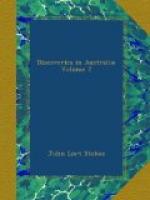(Footnote. See Mr. Eyre’s Discoveries in Central Australia.)
CAPTAIN STURT.
At Adelaide I had the pleasure of making the acquaintance of the intrepid traveller Captain Sturt, who has since again taken the field, endeavouring to penetrate to the interior of the Australian continent, and to remove the veil of mystery that now hangs over it. From him I learnt that the same strange kind of bird, a species of rail, that once visited Swan River, also made its appearance in South Australia on one occasion. I have already alluded to this remarkable circumstance in a former chapter.
During our stay we visited Mount Lofty, placed by our observations in latitude 34 degrees 58 minutes 20 seconds South, and longitude 12 degrees 30 minutes 20 seconds West of Sydney. The cool air of this range, the greatest elevation of which is 2200 feet, was very pleasant after a ride over the heated plain. I was agreeably surprised to find in the heart of the hills a most comfortable inn, where our party sat down to a luncheon of lamb chops and green peas, with a beautiful cool bottle of sherry. Such is the march of civilization! To the north of our road was a lead mine, which will ultimately be a source of great riches to the colony; for which, indeed, nature has done much in the way of mineral productions.
NATIVE SCHOOLS.
I was greatly pleased with the apparent success that had attended the schools of the German Missionaries; and especially with the aptitude for learning displayed by both boys and girls; but my pleasure would have been much increased had I not felt convinced that the system of education adopted, possessed many serious defects. In the first place, sufficient care did not seem to have been taken to recommend the schools to the natives, and to induce them to send their children voluntarily. That it was necessary to resort to some means of effecting this beyond mere persuasion, will be evident when we recollect how useful even the youngest member of an Australian family is to its parents. Almost as soon as the child begins to walk, certainly as soon as it is capable of receiving instruction, light tasks, even in the hunting expeditions, are allotted to it; so that, to remove either boys or girls, and take them to school, is, in reality, to deprive their friends of assistance, which to them is valuable. For this reason, some compensating advantage should be offered to the father, to prevail on him to send his children to school.
Again, when once pupils have been procured, it is exceedingly unwise to allow them to maintain a constant intercourse with their tribe, and be thus subjected to deteriorating influences that must almost irresistibly combat the beneficial effects of their education. But it is needless to dwell further on this subject, as Mr. Eyre has so completely stated the question in his late work.
REMARKS ON THE SYSTEM FOR CIVILISING THE NATIVES.




